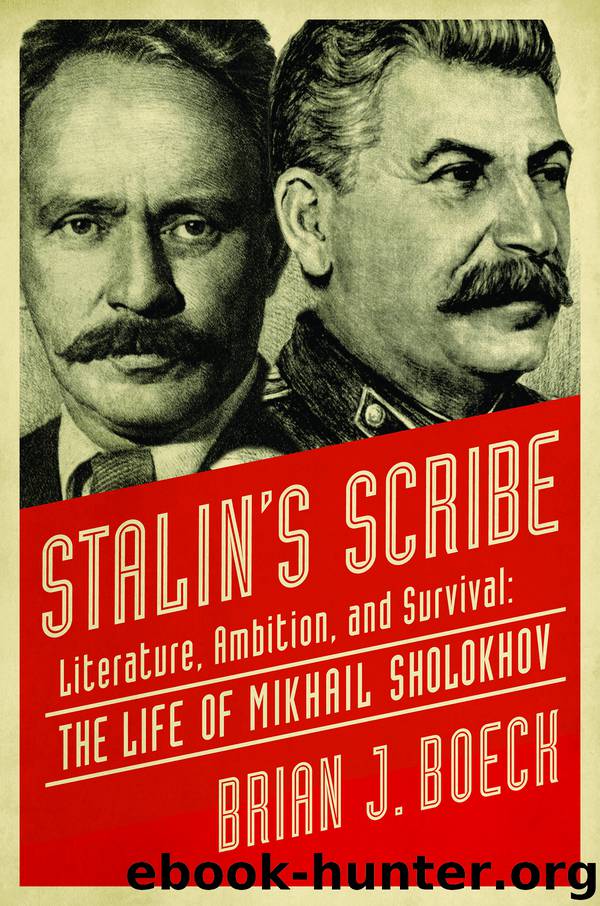Stalin's Scribe by Brian Boeck

Author:Brian Boeck
Language: eng
Format: epub
Tags: Epub3
Publisher: Pegasus Books
TWENTY
Upon the conclusion of the war, Sholokhov came under intense pressure to deliver the novel he had promised to Stalin. He boasted to journalists in Moscow in September 1945 that he would soon travel to Stalingrad to acquire crucial information for narrating the historical battles that took place there in 1942. But instead of conducting extensive research in Stalingrad, he journeyed to the steppes of Kazakhstan to hunt.1 Since Stalin kept tabs on the writer, such behavior risked alienation. Sooner or later the dictator’s patience was bound to run out.
Why did Sholokhov lose his first battle with the war novel Stalin craved? Personal tragedy once again derailed political expediency. On a visit to Moscow soon after the end of the war he received news that shook him to the core. He found out that Vas’ka’s fate had taken a dramatic turn.2 Matilda Kudasheva had received a letter with a strange military postmark. The letter revealed that Vas’ka had not died in 1941. Captured by the Germans, he had been transported to a concentration camp in German territory, where he became acquainted with the letter’s author. They had evidently made some sort of pact to memorize the other’s address to send word to the other’s family. The letter provided frustratingly few facts due to military censorship. Sholokhov could only imagine the hell his friend had endured. He knew from interviews with POWs during the war that starvation, disease, humiliation, and torture awaited them. Tormented by thoughts about captivity, which remained a taboo topic in the postwar era, he could not write about the war in a heroic mode.
Stalin was losing patience. Concerned about Sholokhov’s lack of tangible progress on the war novel, Stalin tried to manipulate the writer’s competitive spirit. In fall 1945, a leading Soviet journal published an article by an American critic who speculated about a novel that would become the War and Peace of World War II.3 The article pronounced Sholokhov to be the writer who was most likely to rise to that level of greatness. Remarkably, this article was unknown in the United States. Most likely it was a special commission to spur Sholokhov into action. However, it had the opposite effect.
Sholokhov began to buckle under the pressure of great expectations. The burden of producing a second masterpiece from scratch was crippling. The stakes were too high, the task too daunting. Even if he somehow stumbled onto a cache of sources, there was no recovering the audacity of youth or retrieving the boundless ambition that once propelled him. Now everything seemed risky. To write risked exposure. To wait risked Stalin’s wrath. His only remaining strategy was to obfuscate and avoid. He would promise progress on the novel, only to put it aside for unexplained reasons. He could not admit that unexpected news and personal tragedy made it painful for him to contemplate the heroic war.
Throughout 1946 Sholokhov could blame the novel’s delays on the bombing of his house by the Germans. The damages it sustained and the hasty repairs in 1944 deprived him of optimal working conditions.
Download
This site does not store any files on its server. We only index and link to content provided by other sites. Please contact the content providers to delete copyright contents if any and email us, we'll remove relevant links or contents immediately.
| American Revolution | Civil War |
| US Presidents |
Fanny Burney by Claire Harman(25784)
Empire of the Sikhs by Patwant Singh(22171)
Out of India by Michael Foss(16312)
Leonardo da Vinci by Walter Isaacson(11901)
Small Great Things by Jodi Picoult(6093)
The Six Wives Of Henry VIII (WOMEN IN HISTORY) by Fraser Antonia(4789)
The Wind in My Hair by Masih Alinejad(4424)
The Lonely City by Olivia Laing(4119)
The Crown by Robert Lacey(4105)
A Higher Loyalty: Truth, Lies, and Leadership by James Comey(4031)
The Iron Duke by The Iron Duke(3639)
Millionaire: The Philanderer, Gambler, and Duelist Who Invented Modern Finance by Janet Gleeson(3568)
Sticky Fingers by Joe Hagan(3454)
Alive: The Story of the Andes Survivors by Piers Paul Read(3309)
Papillon (English) by Henri Charrière(3269)
Joan of Arc by Mary Gordon(3257)
Stalin by Stephen Kotkin(3084)
Aleister Crowley: The Biography by Tobias Churton(3019)
Ants Among Elephants by Sujatha Gidla(2924)
